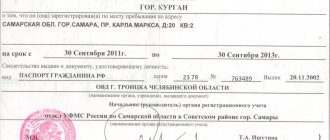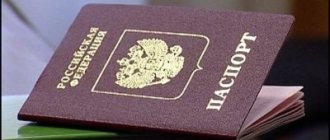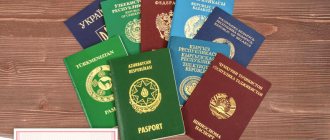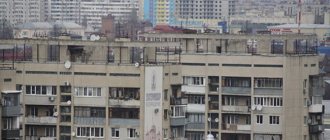Registration of a citizen at his place of residence is of great importance for him; it gives rise to a number of security conditions for the exercise of his legal rights and obligations, and the rights and obligations in relation to other members of society.
Although it does not restrict the right of movement both in our country and in foreign countries, what is citizen registration for? Registration gives you the right to get a job, get a place for your child in child care institutions, qualified medical care - this is simply necessary to receive government support. If a general civil or foreign passport has expired, it will not be exchanged for a new one. And this creates many problems when getting a job, traveling abroad, and in other everyday situations:
- When submitting an application for marriage registration, the inspector will refuse you, even if you are already well advanced in your pregnancy: these circumstances do not affect the decision to refuse. Only registration can be the basis for registering civil legal relations;
- Sometimes, when selling residential property, the new copyright holder requires a mandatory extract from the premises, and the lack of even temporary registration at the new place of residence gives rise to a refusal of medical care, a refusal to hire, and many other refusals;
- Living without registration at your current place of residence does not give you the right to a place in a kindergarten, school, or other educational institution. No one has the right to admit a child to a kindergarten or school if the parents are not registered at the location of the child care institution;
- When purchasing residential space with a mortgage, citizens may sometimes think that the property belongs to the bank and registration with it is impossible. But this is a grave mistake, if you do not register at your place of residence, then in the event of a conflict with a credit institution, you will not be able to prove that this is your only home, and there is simply nowhere to evict you;
- Sometimes quite quarrelsome situations occur between close relatives, one of whom is the owner of the premises, and the other lives in it with his consent. So, the owner of the property can ask you to move out of the apartment at any time if you are not registered in it under certain conditions: sometimes registration is done for up to 5 years. And all this time they cannot make claims against you and force you to move out;
- And in the event of an attack by robbers, or theft of your property, you will not be able to get help from the police: which department will you contact if you are not registered anywhere? The police only accept applications from those registered at a specific place of residence.
Length of stay without registration
Since July 2006, registration of foreign citizens and stateless persons has been cancelled, but special migration records of these persons have been maintained at their place of residence. The registration of migrants has a notification property, that is, by this action the state controls the influx of foreigners, in a number of cases, except for those provided for by current legislation. Any foreigner entering the country must register with the migration authorities within 7 working days, but in some cases it is also necessary to obtain permission to register.
You cannot obtain registration without special permission in the following places:
- In the Russian border zone;
- In closed towns, for outside stay of the territorial entity;
- In military units;
- At military and strategic sites, entry to which is carried out with a special permit;
- In places of emergency and martial law;
- In other regions that are subject to permission from local authorities.
Migration registration of foreign citizens consists of registration at the place of residence or study. The registration procedure and established deadlines are regulated by the Administrative Code and regulations of the Federal Migration Service of the Russian Federation.
In what cases is double registration allowed?
There are many life situations when a second registration may be required:
- long-term treatment in another locality;
- change of place of residence due to work/study, etc.
Temporary registration gives the following rights:
- be observed in the clinic attached to the house;
- receive social guarantees;
- participate in voting;
- take loans from banks (if there are no restrictions set by the bank itself), etc.
Temporary registration is issued for children if they need to get to school or kindergarten:
- in another area of the city;
- in another locality of the country at the place of temporary stay/residence of the parents.
According to the law on education of the Russian Federation, children living in the territory assigned to the school have a preferential right to enrollment in an educational organization, regardless of whether their registration is permanent or temporary.
Only Russian citizens have the right to double registration. This benefit does not apply to foreigners.
Interesting article: Registration of military personnel at a military unit
Citizens who need registration
To a permanently residing foreign citizen who arrived in the country to perform his work or educational duties, within 7 days from the date of arrival, except:
- Those foreign citizens who do not have a permanent place of residence;
- Who is registered in a hotel, inn, sanatorium, holiday home, campsite or medical center where he undergoes a medical examination;
- Works on a rotational basis;
- He is in a rehabilitation center and has no fixed place of residence;
- In places of administrative punishment.
How registration takes place at the place of residence
Sections III and IV of the rules establish the following procedure for registering citizens at their place of permanent residence:
- Within a week after moving into a new address, a citizen must appear at the district department of the Ministry of Internal Affairs, present his passport, a completed application, and a document on the basis of which he enters this room/apartment/house.
- The application can be submitted electronically through the government services portal, and a lease agreement, social lease, etc., may not be presented if it has been registered with the relevant government authorities.
- Registration is carried out within 3 days from the date of receipt of documents (special deadlines are provided for the case of submitting documents through the MFC).
If a citizen applies for paperwork to one of the persons listed in the previous section (the owner of the property, etc.), then the latter, within 3 days, submits to the Ministry of Internal Affairs an application, a resident’s passport, a document indicating the basis for the resident’s residence at this address, (p 17 rules).
The rules do not contain a requirement for a power of attorney. A more detailed description of the registration process at the place of residence is contained in the administration. regulations, approved by order of the Ministry of Internal Affairs of Russia dated December 31, 2017 No. 984.
Note! There is no state fee for this procedure.
Rules and terms for registration of a Russian citizen
Many residents of backward cities strive to come to Moscow or St. Petersburg, hoping to receive decent pay for their work there. Or residents of a provincial town come to the capital to study; do such citizens need registration?
If you are going to leave your hometown for a period of less than 3 months, then there is no need to register at your place of residence; for this it is enough to have registration at your permanent place of residence in your city. Of course, after this period, penalties may be applied to you, but how can you prove that you are longer than this period? A citizen is registered at the passport office at the place of stay, for this the following documents are required :
- A general passport proving your identity;
- Application for registration;
- Permission to move in from the owners of the residential premises.
It is very difficult to obtain such permission if you are going to register with strangers and not with relatives. For example, the owner of a rented apartment, with whom you have agreed on accommodation, does not want to pay extra taxes on profits from renting a room, then you can agree with him on a free (no payment, fictitious) rent of a room. And then you can register with this agreement without any problems.
Rules for registration of citizens of the Russian Federation
Law No. 5242-1 determines the procedure for registering at the place of residence, i.e. in the premises where the citizen lives permanently or most of the time. It could be an apartment, a house, a room. In addition, registration is also required at the place of stay, i.e. premises in which a person lives temporarily. These include a hotel, tourist center, sanatorium, holiday home, medical facility, etc. You need to register if your stay is longer than 90 days. It is allowed not to register at the place of residence if it is located in the same subject of the Russian Federation as the citizen’s place of residence.
Important! To register at your location, you do not need to deregister at your residential address.
According to Art. 6 of Law No. 5242-1, when changing place of residence, a citizen is obliged to submit documents for registration within a week from the moment of arrival, namely, a passport and a document that is the basis for moving in, for example, a social tenancy agreement, a certificate of ownership of housing, contract of sale.
Important! The citizen has the right not to present this document; the registration authority will request this information as part of interdepartmental interaction.
If other residents are registered in the premises, their written consent to move in is required. Documents can be submitted to the accounting authority in person or through authorized persons of the HOA or management company at the place of residence. It is also possible to submit them through the government services portal, although in this case you will still need to appear with your passport at the registration authority. The processing time depends on the method of submission and the availability of all necessary documents and is:
- up to 6 calendar days when an application is submitted through the responsible persons of the HOA or management company;
- up to 8 calendar days, if a document confirming the right to move in is not presented;
- on the day of presentation of the passport and supporting document when sending a request through the portal.
After registration is completed, a corresponding mark is placed in the citizen’s passport. Minor children receive a certificate of registration. Registration is free.
What are the risks of staying without registration?
Not only can a citizen not receive qualified medical care or legally get a job, but penalties may be applied to him; the amount can range from 1.5 to 2.5 thousand rubles. But there are exceptions: a wife can live with her husband without registration if she does housework and childcare. But for a child, registration is desirable, if not mandatory: getting a place in a child care facility is possible only on the basis of registration actions and registering the child with migration registration.
But those who provide their housing for citizens of other regions or countries also face penalties in the form of a fine for non-payment of income tax. In Moscow it can be up to 5 thousand rubles.
But this cannot limit other rights of a citizen; the Constitution enshrines the right of anyone to freedom of movement throughout the country.
Nuances of double registration
Let's consider situations when there is a registration in one city, but another one is needed in another place.
Both in the same city
If a person is permanently registered in one place in the city, but actually lives in another area of the same locality, then the citizen does not have the obligation to obtain a temporary registration. The norm is prescribed in Art. 5 of Law No. 5242-1.
A person can do double registration within the boundaries of one city if it is necessary to issue social benefits according to territorial affiliation, for example, to register at a clinic, enroll a child in school, etc.
In different cities
If a person lives in another region of the country for a long time, temporary registration is required (no later than 90 days from the date of arrival). Otherwise, you may face a fine under Art. 19.15.2 Code of Administrative Offenses of the Russian Federation.
In a situation where a citizen has two apartments in different localities, and he lives in each alternately for a long time, it makes sense to obtain two registrations. The owner can decide for himself for what period to obtain temporary registration for himself in the second apartment.
Whether temporary registration is needed when living in different cities depends on whether they are located in the same subject of the Russian Federation or not. If cities are located within the boundaries of one region, then registration is not an obligation, but a citizen’s right.
So, one thing is:
- Moscow and Moscow region;
- St. Petersburg and Leningrad region;
- Sevastopol and the Republic of Crimea.
For example, a person is permanently registered in Moscow. He can live and enjoy state guarantees in the adjacent territory (for example, in the Moscow region) without obtaining temporary registration.
Interesting article: What types of registration exist in Russia?
In different countries
Residence in another state does not limit the right of a citizen of the Russian Federation to permanent residence within the Federation. But it imposes an obligation to register temporarily at the place of arrival.
It's necessary:
- To a foreign country to control the migration of people from other countries.
- For the citizen himself to receive certain types of services abroad (the ability to go to medical institutions, to get a job, to receive help from the Russian Embassy, etc.).
The conditions are completely different for people who have dual citizenship. In this case, a person can have 2 permanent residence permits (one in each country).
Fictitious registration: new provisions
Any business that generates income is very attractive to scammers. Well, there are a lot of offers to register in a hostel or private house on the market for such services. But such actions of private owners are subject to violation, since only the Migration Service of the Russian Federation can deal with this.
The Law of the Russian Federation of December 3, 2013 “On strengthening liability for violation of the rules of registration and migration registration on the territory of Russia” imposes prohibitions on:
- To provide inaccurate or unreliable information for registration;
- Without the intention to live in this residential premises;
- Without the consent of the apartment owner.
Failure to comply with these provisions may result in a citizen being subject to administrative liability or criminal prosecution.
Persons responsible for transferring documents for registration
The rules list the obligated persons who must promptly contact the department of the Ministry of Internal Affairs in order to register citizens at their place of residence. These include:
You can find more complete information on the topic in ConsultantPlus. Full and free access to the system for 2 days.
- State officials of all types of government bodies working in the field of housing relations, including those associated with administrative and other administrative and economic functions for managing and monitoring compliance with the rules for using public housing stock.
- Owners of apartments, houses, etc.
- Persons authorized by the homeowners association.
- Managers of the housing stock of legal entities.
- Persons authorized by the housing cooperative bodies.
- MFC employees.
The listed persons are also subject to liability for violating the rules.
How can you establish the fact of residence without registration?
If a person is registered, then in his civil passport there is a note: the citizen is temporarily or permanently registered at the address of residence.
If a citizen still lived in a residential building, but does not have a registration stamp, then this can be proven by other means, for example, by the testimony of neighbors.
But if this does not help, you can contact the judicial authorities, where the issue of your residence without registration will be considered, and only a court decision can serve as the basis for recognizing this fact.
In most cases, registration is absent for reasons beyond his control: the living space does not meet sanitary standards, the building is dilapidated, where registration of new residents is prohibited, or a ban on registration comes from all residents.
Amounts of penalties
If government agencies have carried out an inspection and the fact of residence of citizens without registration with the Federal Migration Service at the place of temporary location has been established or the registration period has been exhausted, then the fine is calculated based on the following considerations:
- Punishment of the homeowner for not submitting information - from 2 to 7 thousand rubles;
- For officials - from 25 to 50 thousand rubles;
- For an organization that has violated the rules of registration - from 250 to 800 thousand rubles;
- For fictitious registration – from 2 thousand rubles.
However, even if government authorities impose a fine, it must be borne in mind that this process must also be carried out in accordance with all the rules. In other words, the fact of an offense must be established documented, with evidence. If there are any, and any other serious violations are added to them, then in addition to a fine, you can also incur criminal liability.
When you can avoid punishment:
- Documentary confirmation of close family ties of a person without registration and a person registered and living in this apartment;
- The presence of a registration stamp in the region at the place of stay and residence without registration, which is important for citizens who rent housing, as well as for those who own several properties.
Evidence of residence without registration
Based on the provisions of Article 264 of the Civil Code, if you cannot prove the legal fact of residence, then all issues must be considered by the court. What needs to be done for this?
- Substantiate your claim. Contact the passport office or insurance company and make a request for any everyday question. The response should state that they cannot give you a comprehensive answer because you are not registered at the specified address. Please attach proof of your actual residence, that is, your address, to your application. Such evidence may include a copy of a receipt for payment of utilities or a warrant for an apartment, and under the application write that you do not have registration. Write all copies of the application and documents in 2 copies, have the secretary give a receipt for their acceptance and endorse your copy. This will be the first basis for filing a claim to establish the fact of your residence.
- The court may involve employees of passport and migration services in the case:
- Please attach to the statement of claim the answers to your requests, a copy of your civil passport, and indicate the address where you actually lived. Try to get your neighbors on your side, take written testimony from them. Pay the state fee and also attach a copy to the application.
- Sometimes courts consider such circumstances to be insufficient to establish the fact of residence. But do not despair, file a petition before the court to involve your close friends or neighbors in the case, who confirmed your residence. Do not try to engage in perjury, this will result in criminal prosecution, all your witnesses must be valid. And not imaginary ones.
The court will consider all your gadflies and may establish the fact of residence, which is what you need.
What is a place of residence?
Place of residence is an object of temporary residence of a citizen . He has a permanent place of residence somewhere, but due to some circumstances he is forced to settle in a completely different place for a short period of time. He has every right to do this.
A citizen at his place of residence is required to notify the registration service after 90 days of being at a different address. This rule applies to citizens of the Russian Federation.
But it is mainly migrants – foreigners who come to the country to work – who are subject to registration . They can stay in the country without registration for only 7 days.
Citizens of the EAEU countries (Armenia, Belarus, Kyrgyzstan, Kazakhstan) have the right to live in Russia for 30 days without registration. Residents of Tajikistan are required to register within 15 days after arriving in the country.
If foreigners have an employment contract for a period of more than 3 months established by law, they can obtain registration for the duration of the contract.
If the employer terminates the employment relationship with the employee, the latter’s registration will cease . If he does not find a new job in Russia, he will have to go home.
Temporary registration
Citizens of the Russian Federation can, after obtaining temporary registration, reside in the territory of temporary residence for up to 5 years. Foreigners can obtain temporary registration in the Russian Federation for a maximum of 1 year.
Temporary registration is subject to renewal . When its validity period expires, the person is obliged to travel outside his location. Otherwise, he faces a fine for illegal residence.
By receiving a temporary residence permit, a citizen is not deregistered at his permanent place of registration. To obtain temporary registration for a foreigner, the receiving party must appear at the migration department of the Ministry of Internal Affairs.
It provides the following set of documents:
- passport of the host party and the migrant;
- migration card filled out at customs;
- documents for the apartment;
- in certain cases a visa may be required.
For the residence of persons without registration, the receiving party faces even greater penalties than the migrant himself . If a foreigner violates the registration rules, he or she may be deported, and subsequent entry into the country will be forever prohibited for him.
Law enforcement officers can check the relevance of its registration on the streets of Moscow, which they often do. For each time caught, a fine will be imposed.
Which citizens are exempt from responsibility for residence registration of documents
- Those citizens who live in one residential building, but are registered in another, of the same locality;
- The spouse, children, children of the other spouse and other close relatives can live without registration if the owner of the home has permanent registration at this place of residence;
- Grandparents, adopted children, and spouses of children may also not be held responsible for lack of registration if the owner of the premises has permanent registration at the given place of residence.
Features of preventive measures
For Russians and foreign citizens, a fine is imposed for living at a temporary place of residence if ninety days have passed from the date of arrival.
However, a fine can only be assessed when government authorities prove the fact of stay and that the deadline has actually been violated. In the case of non-residents, this is easier to do than with persons with Russian citizenship. It is taken into account that punitive measures are not applied if the offender simply does not have specific living space. Dear readers! Our articles talk about typical ways to resolve legal issues, but each case is unique. If you want to find out how to solve your specific problem, please contact the online consultant form on the right →
It's fast and free!
Or call us by phone (24/7):
If you want to find out how to solve your particular problem, call us by phone. It's fast and free!
+7 Moscow,
Moscow region
+7 Saint Petersburg,
Leningrad region
+7 Regions
(the call is free for all regions of Russia)
The owner of the apartment who hosts a temporary tenant is obliged to inform the migration service about him on time.
It is possible to apply a fine to a person who does not have documentary evidence of the grounds for being in an apartment, house or other residential premises if he has Russian citizenship. That is, for foreign citizens staying without registering them at their place of residence, it is the owner of the property who will pay the fine. Therefore, you can either be very careful, without attracting the attention of vigilant neighbors who are sometimes very bored, or complete the procedure according to all the rules immediately and on time.
Consequences of violations of the rules of residence registration
Since 01.2014, the administrative liability of citizens for violations of registration rules that have a criminal component has been tightened: citizens may be subject to fines from 2 to 5 thousand rubles for individuals, and up to 250 thousand rubles for legal entities.
For establishing the fact of fictitious registration of citizens, criminal prosecution is provided: they can impose fines from 100 to 500 thousand rubles, or be subject to forced labor for up to 3 years, or imprisoned for up to 3 years, without the right to further hold their previous position.
Scope of migration control
In the field of migration control, when it comes to registering foreign citizens, there is its own system for calculating fines.
If non-residents violate the rules of notification of migration authorities, they will face a fine ranging from 2 to 5 thousand rubles. If the registration procedure is violated due to the fault of the receiving party or the responsible organization providing work on the territory of the Russian Federation, then they face stricter liability and a fine of 40 to 50 thousand rubles. For hosts, who are individuals who have missed the deadline for registering foreign citizens in their apartment or who have ignored this procedure altogether, a penalty of 2 to 4 thousand rubles is imposed. In cases where the receiving party has not fulfilled the obligations stipulated by the migration service, due to which the foreigner does not have the necessary documents, then individuals will have to pay from 2 to 4 thousand rubles, and legal entities and officials - from 40 to and up to 50.
When providing housing and transport to foreign citizens in violation of the established procedure, individuals are liable in the form of a fine in the amount of 2 to 4 thousand rubles, officials - from 25 to 30, and commercial companies - from 250 up to 300 thousand rubles.
What is the difference between the place of residence and the place of actual residence?
We have figured out what the place of stay and the place of actual residence are. It remains to understand what the main differences between these concepts are.
The place of actual residence has its own characteristics, in particular:
- Accommodation takes place in the property on the basis of ownership or under a long-term lease agreement.
- There is a permanent registration at the actual place of residence.
- Utilities must be paid for a permanent residence property.
- At the place of permanent registration, a citizen can draw up any documents at government agencies and services.
- There are no restrictions on permanent residence in receiving medical services, educational and social assistance.
- At the place of permanent residence, you can conduct business activities and dispose of property.
The place of temporary stay, in turn, has other features:
- The residential premises are located in another city.
- You can temporarily live in a hotel, sanatorium, service apartment and other non-standard premises.
- Temporary registration has a validity period, after which it is subject to renewal.
- Temporary registration has a maximum validity period for everyone.
- The landlord can evict a temporary tenant at any time.
- Utilities are paid by the owner of the premises, with the exception of fees for the use of water and electricity.
- A certificate of temporary registration is issued in the form of a passport insert.
Having temporary registration, a person can also use all medical services, but only during the period of validity of his registration.
Even if you become ill and are taken by ambulance to the hospital, you will be quickly discharged home unless there is an urgent need for surgery or other resuscitation measures. No one will keep unregistered people in free wards if you are citizens of another country .
This has nothing to do with Russians. They can freely receive medical care simply by stamping their health insurance policy with a local insurance company stamp.
He can apply for a pension, obtain a driver’s license, register a car, enroll his children in school or kindergarten, draw up various documents, open an individual entrepreneur or LLC, and much more.
A citizen with temporary registration can even participate in voting, the main thing is to have an absentee ballot in hand. Foreigners cannot vote even if they obtain temporary registration.
Difference in deregistration
A person who has a temporary registration can be deregistered upon his personal application or at the request of the receiving party.
The receiving party may rebel if the tenant does not pay rent, leads an antisocial lifestyle, damages her property, or does not live at the established address at all.
Registration authorities can deprive a foreigner of temporary registration for medical reasons. If, for example, a migrant is diagnosed with tuberculosis.
The fine for living without a temporary residence permit is from 2 to 7 thousand rubles, depending on the region where the offense was committed.
The receiving party for foreigners is often legal entities in which they are employed under a contract, employment agreement or civil law agreement.
The main thing is that such an employer is accredited to hire foreign personnel. Otherwise, he faces huge fines of up to 1 million rubles.
The place of permanent registration may be canceled in the following situations:
- At the request of a registered citizen when moving to a new home.
- If a citizen is called up for military service.
- When a citizen is deprived of liberty by a court verdict.
- When a citizen is declared missing by a court decision.
- If a person has died, as proven by a court decision or a death certificate.
- The citizen was evicted by court decision.
- When registering, the citizen provided unreliable or deliberately false information about himself.
A citizen does not always sign up from one address to a new one . In certain cases, you can be discharged from your place of residence “to nowhere.” In this case, when filling out the application, you must indicate a fictitious address of the new potential residence permit.
No one will check the accuracy of this information unless it concerns the discharge of minor children.
If children are discharged from the apartment, they must receive equivalent or better housing to live in. This is monitored by the guardianship and trusteeship authorities.
The place of actual residence and stay are two different things . In the first case, citizens live permanently at their place of residence on the basis of permanent registration.
In the second case, the citizen temporarily resides in someone else’s premises with the permission of the receiving party on the basis of temporary registration.
Answered by the chief scientific consultant, Ph.D. n. Dmitry Yastrebov:
Yes, it does. However, there are certain rules that citizens often forget about.
The law obliges citizens to register at their place of stay and place of residence within the Russian Federation. With the consent of the owner, citizens have the right to register in any housing located within the territory of Russia.
If a citizen temporarily resides in a foreign city, then he can stay there for 90 days, and after their expiration he has the obligation to contact the Federal executive body authorized to exercise control and supervision functions in the field of migration (GUVM MIA) and register .
If a citizen changes his permanent location, he has only seven days to apply for permanent registration. The corresponding registration stamp is entered into the passport at the place of permanent residence.
The procedure for registration actions (procedures) is determined in accordance with the Administrative Regulations for the provision of public services for the registration of citizens at the place of stay and place of residence within the country.
For living at the place of stay or at the place of residence in a residential building without registration, a citizen may be subject to an administrative fine in the amount of 2 thousand to 3 thousand rubles. If such a violation is committed in Moscow or St. Petersburg, then the fine increases from 3 thousand to 5 thousand rubles.
It is important to note that the legislation does not provide for separate punishment for late registration. That is, persons who have overdue registration bear the same responsibility as those who have not received it, and the period of delay does not play any role at all. Also, current legislation provides for a number of cases when living without registration is not punishable.
Text prepared by Maria Gureeva
Do not miss:
Is a Russian citizen obliged to live at his place of registration?
All rules regarding registration are regulated by federal legislation (RF Law No. 5242–1) and if they are violated, a person must be held accountable.
Administrative liability for violation of these laws is provided for all persons over the age of sixteen:
- For violation of registration standards, a fine of 1,500 to 2,500 rubles is provided.
- Since the beginning of 2014, the fine for accommodation without registration is 2,000–4,000 rubles.
- A concept called fictitious registration is used; this is when a person registers, but clearly does not intend to live at this address. In this case, a person who fictitiously registers another person on his premises faces criminal liability or a fine of up to 500,000 rubles.
To register a foreigner, the receiving party of a foreign person must contact the territorial Federal Migration Service of Russia, the post office or a multifunctional center that provides state and municipal services.
It notes the mandatory nature of the procedure for both Russian citizens and foreign nationals, as well as the consequences of failure to comply with its standards. The essence of the “registration accounting” procedure is to register citizens at their place of residence or place of residence and deregister if they move to another place.
Registration of citizens must be carried out at the place of permanent residence, regardless of the ownership of the living space or temporary stay.
We invite you to familiarize yourself with: The order and procedure for entering into inheritance under the law
Yes, about quibbling. They can, they can.
Code of the Russian Federation on Administrative Offenses
Article 19.15.
Residence of a citizen of the Russian Federation without a citizen's identity card (passport) or without registration
shall entail the imposition of an administrative fine in the amount of one thousand five hundred to two thousand five hundred rubles.
shall entail the imposition of an administrative fine in the amount of two thousand to two thousand five hundred rubles.
If they open it, you can always say that you came to visit. If you are in a dressing gown and doing laundry, you can always say that you will live here for a week at the request of the owner, who is away.
October 25, 2020, 08:41 Vladimir, Moscow
You must live according to your registration, but if you change your place of residence and live at a new address, you must register at your new place of residence.
Federal Law of July 18, 2006
Article 20 of the Civil Code defines that a person’s place of residence is the place where he lives permanently or most of the time. After registration, the place where the citizen registered will be his residence address.
Article 20. Place of residence of a citizen
- Place of residence is the place where a citizen permanently or primarily resides. A citizen who informs creditors, as well as other persons, about his other place of residence bears the risk of the consequences caused by this.
- The place of residence of minors under fourteen years of age or citizens under guardianship is recognized as the place of residence of their legal representatives - parents, adoptive parents or guardians.
It is appropriate to recall, and this is important, that registration can be permanent or temporary. The latter is provided for the period of work or study, in some other cases.
But the address of his permanent registration will be considered his permanent place of residence.
Place of passport registration - what is it? This is the address of the home where the citizen is registered. In other words, a person notifies the state that he will live in such and such an apartment, at such and such an address.
After this, appropriate notes are made in the accounting documents, and an entry is made in the citizen’s passport indicating his residence address, that is, registration.
Registration of foreigners
According to the law “On Migration Registration”, all foreigners entering the territory of Russia must obtain temporary registration . A week is given for this. You must register at the address of your stay: in rented housing, the apartment of a relative or friend, etc.
.
n. Registration is carried out by the owner of the premises
. It occurs on a notification basis, that is, permission is not required. To do this, you need to contact the migration service, post office or MFC.
The period of temporary stay is no more than 90 days . If you wish to stay for a longer period, you must obtain a temporary residence permit. It is issued for three years
.
But to obtain a temporary residence permit you will have to meet a number of requirements
. In addition, the number of permits is limited, as they are issued based on a quota. Registration is regulated by Article 6 of the Law “On the Legal Status of Foreign Citizens”.
After receiving a temporary residence permit, you can apply for a residence permit (if there are grounds for this). The requirements and rules are described in Article 8 of the Law “On the Legal Status of Foreign Citizens”. The legal presence of a foreigner in the Russian Federation is possible only in three options: with registration as a temporary stayer, with a temporary residence permit or a residence permit.
The differences between these statuses are presented in the table:
| Temporary registration | RVP | Residence permit | |
| Validity | no more than 90 days in six months | 3 years | 5 years |
| Decor | notification | by decision of the Federal Migration Service within the quota | by decision of the Federal Migration Service |
| Extension | possible within the maximum period | No | Yes |
Dear readers! The articles describe only typical (template) situations and methods for solving them. It is worth considering that each case is unique, and solving a separate issue requires an individual approach
.
To find out how to act specifically in your case, we recommend using a free consultation by calling the number for Moscow and Moscow Region, +7 (812) 309-13-76 for St. Petersburg and the Leningrad region
.
What is place of residence and registration, is there a difference?
The place of registration is recorded in the resident’s passport, and a corresponding stamp with the address of the residential premises is entered into it.
Government bodies record the registration address for :
- exercising supervisory functions;
- determination of statistical data on the volume of financing of social benefits;
- the number of educational and medical institutions in the place of official registration (permanent) of citizens.
Having a problem? Call a lawyer:
Moscow and Moscow region (toll-free call) St. Petersburg and Leningrad region






